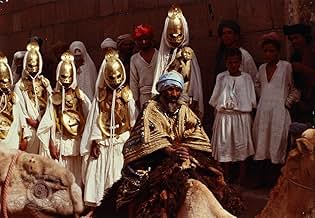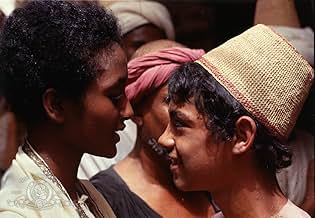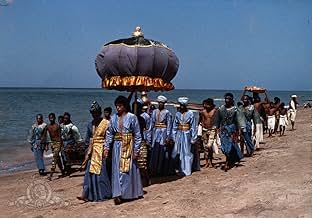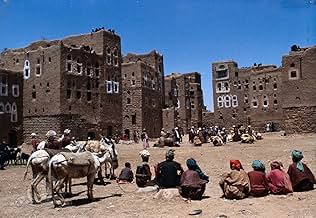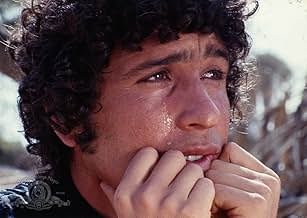IMDb RATING
6.6/10
9.7K
YOUR RATING
In ancient Arabia, a beautiful slave girl chooses a youth to be her new master, then she is kidnapped and they must search for each other. Stories are told within stories: love, travel and t... Read allIn ancient Arabia, a beautiful slave girl chooses a youth to be her new master, then she is kidnapped and they must search for each other. Stories are told within stories: love, travel and the whims of destiny.In ancient Arabia, a beautiful slave girl chooses a youth to be her new master, then she is kidnapped and they must search for each other. Stories are told within stories: love, travel and the whims of destiny.
- Awards
- 1 win & 3 nominations total
Tessa Bouché
- Aziza
- (as Tessa Bouche')
Margareth Clémenti
- Madre di Aziz
- (as Margaret Clementi)
Elisabetta Genovese
- Munis
- (as Elisabetta Vito Genovese)
- Director
- Writer
- All cast & crew
- Production, box office & more at IMDbPro
Featured reviews
This very unique rendering of the Arabian Nights was filmed in natural locations in places as diverse as Ethiopia, Yemen, Iran and Nepal. The beauty of the landscapes is breathtaking, and makes the film an incredible voyage into time and space.
Please note that this movie is an explicitly erotic one, but one tends to forget that the original Arabian Nights were very much so, and not fairy tales for children. It is certainly difficult to make an erotic masterpiece, as sexual content does not make a movie better. It rather tends generally to get crassly exploitative, and rarely beautiful. There is plenty of sex in this movie, but it is depicted in a natural, feel-good and intelligent way that is rarely to be found elsewhere.
By the way, this movie should be seen again at the light of nowadays controversies. The Muslim world was far from always having been puritanical, and the sensual poetry that is rendered here is not Pasolini's invention. It is the faithful reflection of a hedonistic Orient that produced for instance poet Omar Khayyam as well as the original Arabian Nights. It is also a film about love, the most gripping part being the tragic and mysterious tale of Aziz and Aziza.
Don't expect any Aladdin or Ali Baba stuff here, you already figured this out. Anyway, it would be impossible to make a complete film version of the Arabian Nights, so this work just shows a few excerpts combined together (the Italian title is in in fact "the flower of the Arabian Nights"). However, the trend of the tales is respected in the sense that all the stories are interwoven into one another and eventually come back to the original plot.
The atmosphere of ancient Orient is rendered in a style that is lightyears away from usual clichés, and in an incredibly authentic and physical way. At times, you get the illusion that you feel the blazing sun on your skin, that you can smell the exotic vegetation, the sand, the noisy bazaars full of spices. There are a few flaws though : visible cutting, unadapted stances of classical music. The use of non professional actors was common for Pasolini, and gives a pleasant feeling of naive freshness.
The movie is probably Pasolini's best, and belongs to the "trilogy of Life" that included "the Decameron" and "the Canterbury tales", also literature classics. But much more than the two others, this movie is an ode to life. Hard to suspect that Pasolini's last work would be an ode to death. "Arabian Nights" belongs to the golden age of Italian cinema, that was incredibly prolific and innovative in the sixties and seventies.
All in all, not a family movie, but if you are curious and open-minded, get ready for a beautiful journey.
Please note that this movie is an explicitly erotic one, but one tends to forget that the original Arabian Nights were very much so, and not fairy tales for children. It is certainly difficult to make an erotic masterpiece, as sexual content does not make a movie better. It rather tends generally to get crassly exploitative, and rarely beautiful. There is plenty of sex in this movie, but it is depicted in a natural, feel-good and intelligent way that is rarely to be found elsewhere.
By the way, this movie should be seen again at the light of nowadays controversies. The Muslim world was far from always having been puritanical, and the sensual poetry that is rendered here is not Pasolini's invention. It is the faithful reflection of a hedonistic Orient that produced for instance poet Omar Khayyam as well as the original Arabian Nights. It is also a film about love, the most gripping part being the tragic and mysterious tale of Aziz and Aziza.
Don't expect any Aladdin or Ali Baba stuff here, you already figured this out. Anyway, it would be impossible to make a complete film version of the Arabian Nights, so this work just shows a few excerpts combined together (the Italian title is in in fact "the flower of the Arabian Nights"). However, the trend of the tales is respected in the sense that all the stories are interwoven into one another and eventually come back to the original plot.
The atmosphere of ancient Orient is rendered in a style that is lightyears away from usual clichés, and in an incredibly authentic and physical way. At times, you get the illusion that you feel the blazing sun on your skin, that you can smell the exotic vegetation, the sand, the noisy bazaars full of spices. There are a few flaws though : visible cutting, unadapted stances of classical music. The use of non professional actors was common for Pasolini, and gives a pleasant feeling of naive freshness.
The movie is probably Pasolini's best, and belongs to the "trilogy of Life" that included "the Decameron" and "the Canterbury tales", also literature classics. But much more than the two others, this movie is an ode to life. Hard to suspect that Pasolini's last work would be an ode to death. "Arabian Nights" belongs to the golden age of Italian cinema, that was incredibly prolific and innovative in the sixties and seventies.
All in all, not a family movie, but if you are curious and open-minded, get ready for a beautiful journey.
Surely there's a lot to admire and enjoy in this movie: the settings and costumes are extremely colourful, the locations exotic, at times almost dreamlike, and at several times there are stunning mass-scenes. All this makes watching it a dazzling and overwhelming experience. But - at least with me - this movie also evokes bewilderment, confusion and irritation.
Using local amateurs can give a feeling of authenticity, but here is such an abundance of amateurism that it gets on your nerves. Many of the cast don't seem to act at all, but just obediently follow orders: they either loiter about or run around frantically, they grin sheepishly or feign to cry, they rattle their obviously later dubbed Italian lines in mostly loud and high-pitched voices, and then sooner or later (mostly sooner) they take their clothes off, that's about it. The musical score is very strange and uneven, at some parts beautiful music (Morricone!), at other times there are long streches of bland silence. Strangely enough never Arabian-sounding music, which couldn't have been hard to find around the locations where they filmed.
I don't mind a bit of nudity and sex, but this is really way over the top: every guy that pops around the corner is stark naked within a minute or two and runs around like that for the rest of the film. And mind you, this is a 1974 movie that actually won a renowned prize (in Cannes)! What on earth is the point of all this exhibitionism, there are numerous instances where there appears to be no functional motivation for it whatsoever.
Maybe Pasolini liked to create confusion and bewilderment. It's only a bit hard to admire this film for just that and for the enchanting cinematography.
Using local amateurs can give a feeling of authenticity, but here is such an abundance of amateurism that it gets on your nerves. Many of the cast don't seem to act at all, but just obediently follow orders: they either loiter about or run around frantically, they grin sheepishly or feign to cry, they rattle their obviously later dubbed Italian lines in mostly loud and high-pitched voices, and then sooner or later (mostly sooner) they take their clothes off, that's about it. The musical score is very strange and uneven, at some parts beautiful music (Morricone!), at other times there are long streches of bland silence. Strangely enough never Arabian-sounding music, which couldn't have been hard to find around the locations where they filmed.
I don't mind a bit of nudity and sex, but this is really way over the top: every guy that pops around the corner is stark naked within a minute or two and runs around like that for the rest of the film. And mind you, this is a 1974 movie that actually won a renowned prize (in Cannes)! What on earth is the point of all this exhibitionism, there are numerous instances where there appears to be no functional motivation for it whatsoever.
Maybe Pasolini liked to create confusion and bewilderment. It's only a bit hard to admire this film for just that and for the enchanting cinematography.
This film version keeps much of the eroticism in Sir Richard Burton's original translation, which previous movie treatments saw fit to water down
Great care was taken in the details: it was shot on location (Africa and the Middle East) and a dark skinned girl was cast as the princess
The acting is extremely good, and the stories connect in and out in intriguing fashion...
The film selects some of the more popular of the Arabian Nights stories, but intertwines them in strange ways Like the original, many stories lead into other stories and again into others
One of the most erotic sequences is when two supernatural beings decide to play a trick on a virginal girl and boy The beings make each young person seduce the other while he or she is asleep In another scene, one of the heroes finds himself in a pool with a group of very pretty, very nude Arabian women, who tease and tickle him into an intense joy
The film selects some of the more popular of the Arabian Nights stories, but intertwines them in strange ways Like the original, many stories lead into other stories and again into others
One of the most erotic sequences is when two supernatural beings decide to play a trick on a virginal girl and boy The beings make each young person seduce the other while he or she is asleep In another scene, one of the heroes finds himself in a pool with a group of very pretty, very nude Arabian women, who tease and tickle him into an intense joy
This was the penultimate film of the great Italian director Pier Paolo Pasolini. It also concludes his "Trilogy of Life", based on medieval story collections (the others are "The Decameron" and "The Canterbury Tales"). Like the others in the series, this is a portmanteau film (i.e. the film is not just one story but several).
The film begins with a young man's search for his slave girl lover, who has been abducted. Along the way, several stories from "The Arabian Nights" are told.
The film has a very loose structure. There are stories, within stories, within stories. This can be quite confusing at times. It was filmed in Iran, Yemen and Nepal and the countries look absolutely spectacular. The main flaw of the film is that it does show signs of being hastily cut (Pasolini himself reduced the film by half an hour before general release, and there may have been cuts due to the censors). This often makes the film seem quite disjointed. One of the dominant themes in this film is love and sex, and yes, there is a lot of explicit nudity here.
The film touches on dreams, reality, deception, truth, freedom and slavery. While by no means perfect, there are times when the Pasolini's genius and humanity shines through.
The film begins with a young man's search for his slave girl lover, who has been abducted. Along the way, several stories from "The Arabian Nights" are told.
The film has a very loose structure. There are stories, within stories, within stories. This can be quite confusing at times. It was filmed in Iran, Yemen and Nepal and the countries look absolutely spectacular. The main flaw of the film is that it does show signs of being hastily cut (Pasolini himself reduced the film by half an hour before general release, and there may have been cuts due to the censors). This often makes the film seem quite disjointed. One of the dominant themes in this film is love and sex, and yes, there is a lot of explicit nudity here.
The film touches on dreams, reality, deception, truth, freedom and slavery. While by no means perfect, there are times when the Pasolini's genius and humanity shines through.
'Il Fiore delle mille e una notte', or 'Arabian Nights', is Pier Paolo Pasolini's final film from his "trilogy of life" and his second to last film in general. His last of course is 'Salo, or 120 Days of Sodom', the controversial first film from his "trilogy of death".
With 'Arabian Nights' Pasolini combines a couple of stories from the book 'A Thousand and One Nights' into one story, although the film itself still feels very episodic. All parts of the story deal with love, or actually I should say lust, ending in sex. Especially the penis gets enough screen time here, it might as well be the leading character. The sex scenes themselves are, in my opinion, not very sensual or erotic (although they admittedly are when you compare them to such scenes in any other Pasolini film) which is not necessarily a bad thing, but it becomes exactly that when more than half the movie exists out of them.
On the other hand the film is pretty entertaining, mostly for its oddness. That again, is something we see in almost any other Pasolini film. His distant approach adds to that feeling, especially when he shows violent images. One might not expect them in a film that arguably celebrates love and sex. Another factor for the oddness is the terrible acting, especially from the men. Maybe good acting is impossible for them here since Pasolini presents them as a bunch of whiners who would do anything for love. Of course, once again, with love I mean sex. The Italian language in the Eastern setting is another thing that feels pretty weird as well. All these elements add to the oddness which makes the film more entertaining than it probably should have been.
I have to conclude with saying that I sort of admire Pasolini. I think only his 'Il vangelo secundo Matteo' can be considered as a truly great film, mostly since his approach is the distant one. I think that is a good thing when it comes to a religious film like that. that approach in his other films is not always the right one, but it is one aspect of why his films are different, often daring. Even when not much is happening, or when we have no clue what is happening, or when we normally would not care that much, Pasolini keeps it kind of interesting.
With 'Arabian Nights' Pasolini combines a couple of stories from the book 'A Thousand and One Nights' into one story, although the film itself still feels very episodic. All parts of the story deal with love, or actually I should say lust, ending in sex. Especially the penis gets enough screen time here, it might as well be the leading character. The sex scenes themselves are, in my opinion, not very sensual or erotic (although they admittedly are when you compare them to such scenes in any other Pasolini film) which is not necessarily a bad thing, but it becomes exactly that when more than half the movie exists out of them.
On the other hand the film is pretty entertaining, mostly for its oddness. That again, is something we see in almost any other Pasolini film. His distant approach adds to that feeling, especially when he shows violent images. One might not expect them in a film that arguably celebrates love and sex. Another factor for the oddness is the terrible acting, especially from the men. Maybe good acting is impossible for them here since Pasolini presents them as a bunch of whiners who would do anything for love. Of course, once again, with love I mean sex. The Italian language in the Eastern setting is another thing that feels pretty weird as well. All these elements add to the oddness which makes the film more entertaining than it probably should have been.
I have to conclude with saying that I sort of admire Pasolini. I think only his 'Il vangelo secundo Matteo' can be considered as a truly great film, mostly since his approach is the distant one. I think that is a good thing when it comes to a religious film like that. that approach in his other films is not always the right one, but it is one aspect of why his films are different, often daring. Even when not much is happening, or when we have no clue what is happening, or when we normally would not care that much, Pasolini keeps it kind of interesting.
Did you know
- TriviaThis film is the final entry in director Pier Paolo Pasolini's "Trilogy of Life," following The Decameron (1971) and The Canterbury Tales (1972).
- GoofsWhen the chimpanzee is writing, it's clearly visible that it's not actually the chimp writing but an actor wearing a glove made to look like the chimp's hand.
- Crazy credits"Truth lies not in one dream, but in many." - Arabian Nights
- Alternate versionsThe 1990 Water Bearer Films video release (WBF 8001) is marked "Original Uncut Version" with a runtime of 133 min. It is rated X.
- ConnectionsEdited into Porn to Be Free (2016)
- How long is Arabian Nights?Powered by Alexa
Details
- Release date
- Countries of origin
- Languages
- Also known as
- Las mil y una noches
- Filming locations
- Mesjed-e-Imam, Esfahan, Iran(Zumurrud's palace)
- Production companies
- See more company credits at IMDbPro
Box office
- Gross worldwide
- $755
- Runtime
- 2h 10m(130 min)
- Sound mix
- Aspect ratio
- 1.85 : 1
Contribute to this page
Suggest an edit or add missing content



